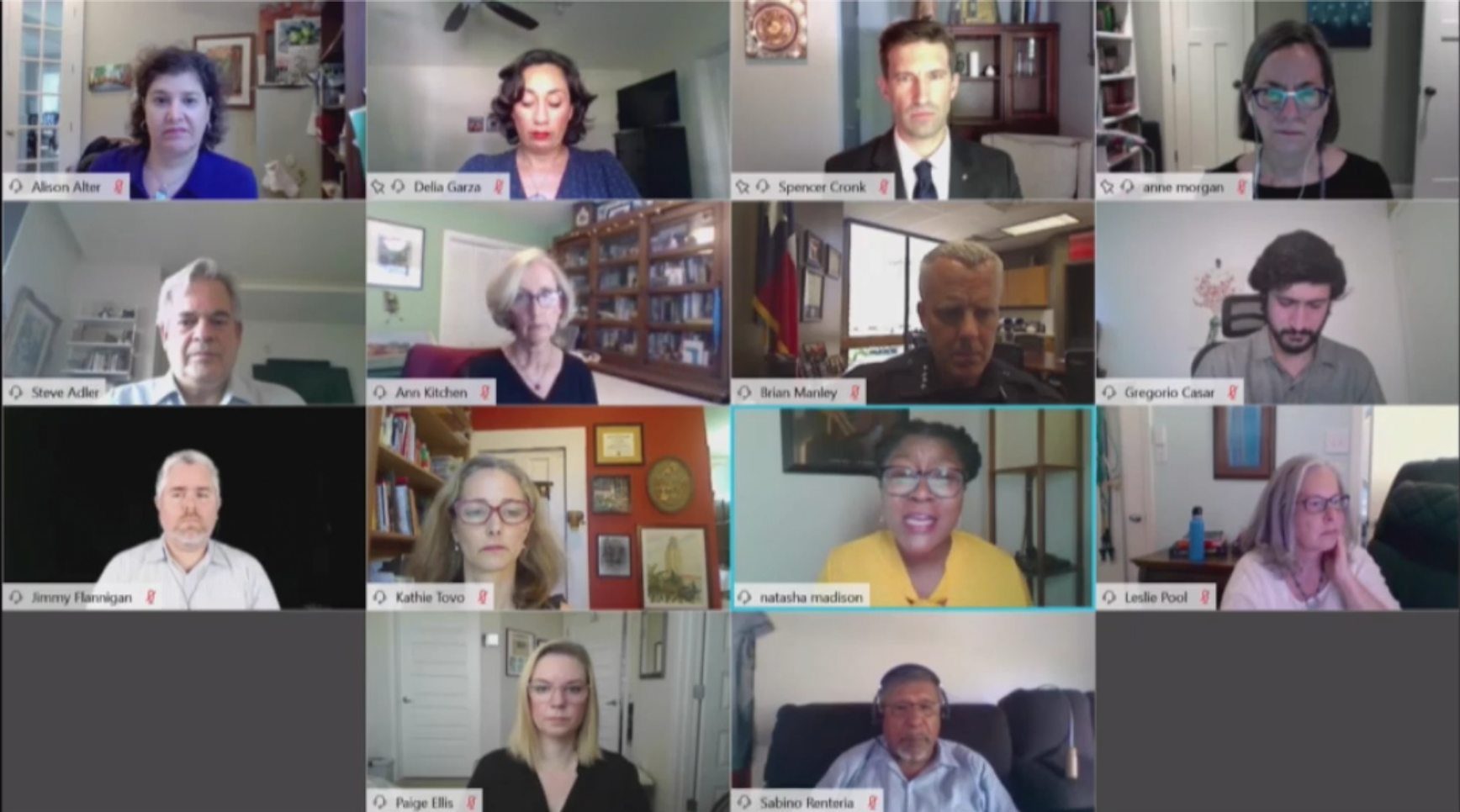Over the past weeks, the nation experienced an outpouring of indignation, anguish and unity in response to the murder of Minneapolis resident George Floyd after video of a police officer kneeling on Floyd’s neck ignited a long-culminating powder keg of anger towards police forces. This powder keg of anger grew significantly during recent months following the murders of Breonna Taylor, Ahmuad Arbery and Austin resident Mike Ramos, each generating outcry against police corruption and brutality.
Following Floyd’s death, protests erupted across the nation, and as Austin residents took to the streets, they faced police officers donned in riot gear. Accounts and videos of Austin police brutality towards protesters went viral, and several protesters were admitted to the hospital with life-threatening injuries caused by “non-lethal” police weapons.
In response to the protests, the Austin City Council called a special meeting on Thursday, June 4, and listened to residents testify for eight hours against police brutality. Many scrutinized the funding and budget of the Austin Police Department (APD). However, city council members concluded the meeting by approving additional funding for APD, missing a largely symbolic opportunity to show solidarity with protesters across the city and nation.
The Meeting
The virtual Austin City Council hearing commenced with discussion of a grant that would provide about $430,685 in continuing funds to the APD from the Motor Vehicle Crime Prevention Authority. Since 1977, the grant has provided for three detectives and two civilian staff to address car theft. The city matches $107,000 to provide benefits to the detective positions. Although the fund is not directly related to police brutality, Austin residents called on the Austin City Council to stand in solidarity with protesters and vote against the funding.
The meeting began with statements from each council member and Mayor Steve Adler, all of whom expressed commitment to meaningful, systemic change. The only black council member, Natasha Harper-Madison of District 1, spoke last before community comments began. During her commentary, Harper-Madison asked Austin Police Chief Brian Manley to turn on his webcam, which was off for the first 40 minutes of the meeting, and face the people.
Over 360 residents signed up to speak ahead of voting at the council meeting, and although speakers were only allotted one minute of testimony, the meeting lasted nearly eight hours. One of the earliest speakers was Edwin Ayala, who provided gut-wrenching testimony on behalf of his 16-year-old brother, Brad Levi Ayala, the victim of a less lethal shooting at last Saturday’s protest.
The Stories
As he struggled to maintain composure, Edwin Ayala described the severe head wound his brother was recovering from as a result of a high-impact beanbag shot. Ayala claimed that his brother’s prefrontal cortex is damaged, he has trouble managing his emotions and is experiencing immense pain. Teachers from Ayala’s school later joined the call to share what a curious and intelligent student Ayala was and condemn police actions that targeted a young man engaging in his civil rights.
In response to testimony regarding Brad Ayala, Council Member Casar asked City Manager Spencer Cronk and Police Chief Manley what they intended to do to prevent this from happening again. Manley stated that the use of bean bags will no longer be permitted on crowds, but added that some situations remain appropriate for the practice. Following speakers used their testimony to push back on Manley’s statement, pointing out that Brad Ayala was standing apart from the crowd when APD shot him in the head.
Sam Kirsch, another victim of a nonlethal shot, related the extensive, risky surgeries that would be needed to heal the bones beneath his eye. Had he not been wearing sunglasses when shot, Kirsch claims the APD may have permanently blinded him.
One speaker shared a shocking and upsetting compilation of protest videos depicting excessive force, including a video of the shooting of 20-year-old Justin Howell at last Sunday’s protest. Council members watched as a team of medics carried Howell’s body to police headquarters, following orders from 911, only to be shot at by police. According to the testimony of Brenton Donnell, founder of Street Medics Austin, the lead medic who assisted Howell needs surgery on her hand as a result of the shooting.
Community advocates like Grassroots Leadership staff member Chris Harris called for justice for the family of Mike Ramos, who was shot by APD in May, and for injured protesters. Harris also demanded the firing of officers involved in each case. Many Austin residents echoed his sentiments and asked for disinvestment in the police and a reallocation of funds into city services and programs.
The Results
Although some speakers argued in support of the APD, the overwhelming majority made their message for council members clear: vote against the additional police funding that was on the table. Despite this, City Council approved the grant resolution by a count of 7 to 4, allocating about $437,000 of funding to an APD car theft program.
Council members Natasha Harper-Madison (District 1), Delia Garza (District 2), Greg Casar (District 4) and Jimmy Flannigan (District 6) voted to reject the grant. Comparatively, Mayor Adler, Pio Renteria (District 3), Ann Kitchen (District 5), Leslie Pool (District 7), Paige Ellis (District 8), Kathie Tovo (District 9) and Alison Alter (District 10) voted to approve the grant. Council will reconvene this Wednesday, June 10, to take comments from residents and continue to address police brutality and incidents related to the protests.

